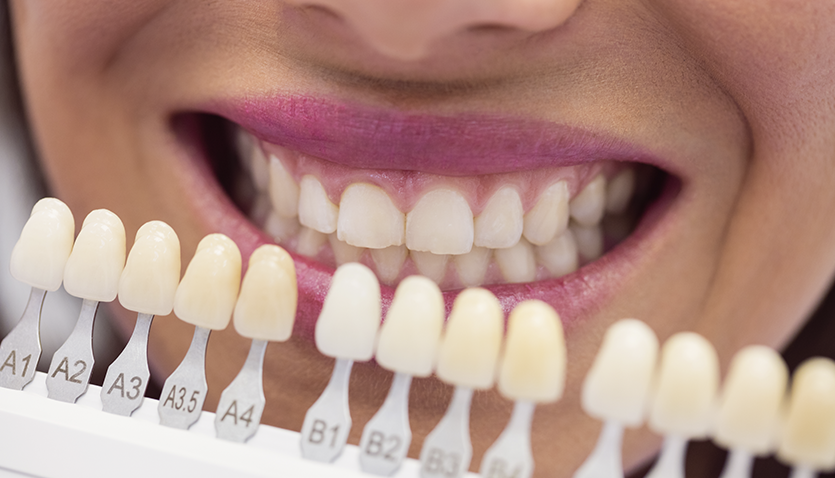
The art of restoring smiles with confidence and functionality.
Dental implants are true wonders of modern dentistry, offering lasting solutions to replace lost teeth, bringing back the joy of smiling without worries.
Similar to natural teeth in appearance and function, dental implants are safe and comfortable, providing a solid foundation for fixed or removable dental prosthetics. In addition to restoring the aesthetics of a smile, implantology also promotes oral health, preventing future problems associated with tooth loss.
But what are Dental Implants?
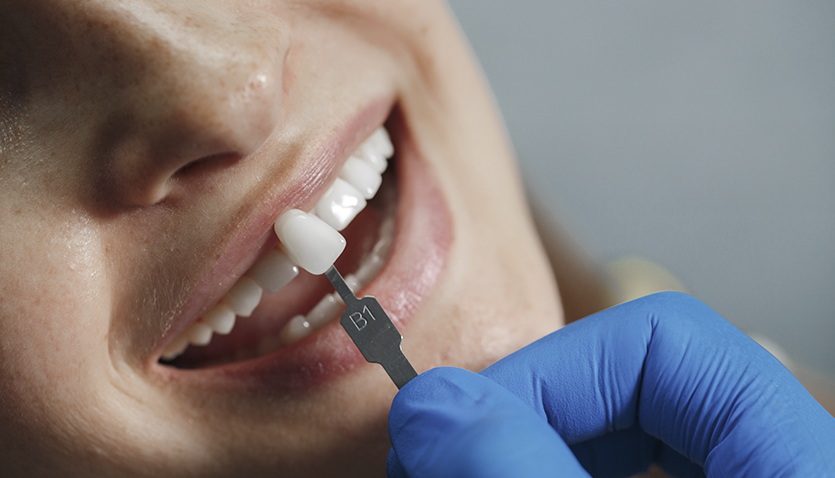
Dental implants are structures made of titanium or similar materials that are surgically inserted into the maxillary or mandibular bone to replace missing or lost teeth. They function as artificial tooth roots, providing a sturdy foundation to support crowns, bridges, or fixed/removable dentures.
procedure
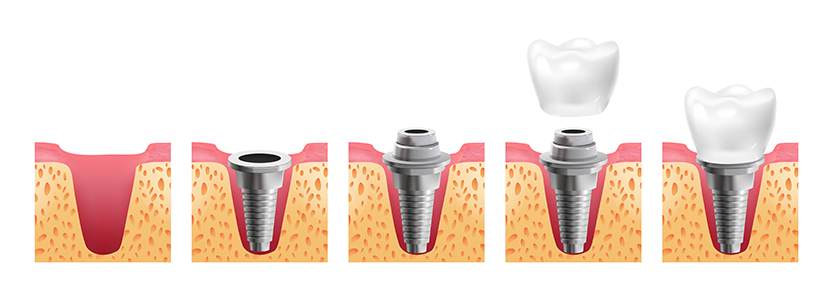
The process of dental implant placement generally involves the following stages:
- 1st stage: Assessment and planning: The dentist or oral surgeon conducts a thorough evaluation of the patient’s oral health and, through the use of X-rays, panoramic radiography, or CT scans, assesses the amount and quality of available bone for implant placement. Based on this, a personalized plan is developed to determine the position and type of implant needed.
- 2nd stage: Implant surgery: During the surgery, the titanium implant is carefully inserted into the jawbone or maxilla. After insertion, a healing period called Osseointegration is necessary, during which the bone grows and fuses around the implant, ensuring a solid and stable foundation.
- 3rd stage: Prosthesis placement: After Osseointegration, a custom dental prosthesis (crown, bridge, or denture) is attached to the implant. This prosthesis will be made of zirconia or porcelain and designed to resemble natural teeth, providing an aesthetic and functional smile.
what are their Benefits?
Dental implants offer several significant benefits, including:
- Restoration of Chewing Function: Implants provide stability and support, allowing patients to eat and chew food safely and comfortably.
- Enhancement of Aesthetics: Implant-supported prosthetics resemble natural teeth, providing an aesthetic and confident smile.
- Preservation of Alveolar Bone: By replacing the roots of missing teeth, implants help preserve alveolar bone, preventing bone loss and resorption.
- Comfort and Security: Implant-supported prosthetics are fixed and stable, eliminating discomfort and concerns about the movement or slipping of removable dentures.
- Longevity: With proper care, dental implants can last for many years, making them a lasting solution for replacing lost teeth.
Porcelain or zirconia crowns?
crowns in pure porcelain
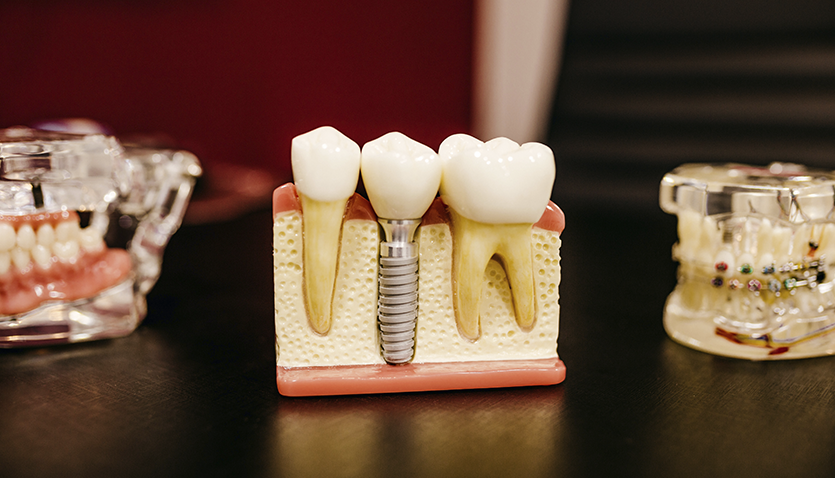
Pure porcelain crowns for dental implants are a highly popular aesthetic and functional option for replacing missing or lost teeth. These crowns are specifically designed to be placed over titanium dental implants, providing a natural and long-lasting appearance.
The pure porcelain used in crafting these crowns is a high-quality material that closely resembles the appearance of natural teeth. It is translucent and reflects light similarly to dental enamel, making the crowns nearly imperceptible in the smile. Additionally, porcelain is durable, long-lasting, and highly biocompatible, making it an ideal choice for dental restorations.
what are their benefits?
The main benefits of pure porcelain crowns for dental implants include:
- Natural Aesthetics: Pure porcelain crowns provide a highly aesthetic and natural appearance, allowing the replaced teeth to seamlessly blend with adjacent teeth.
- Durability: Pure porcelain is a resilient and durable material, offering long-lasting consistency for the dental implant.
- Biocompatibility: Porcelain is well-tolerated by gum tissue and does not cause irritations or allergic reactions, making it a safe choice for oral health.
- Stain Resistance: Pure porcelain crowns have a smooth and non-porous surface, making it difficult for stains and discolorations to adhere, maintaining shine and aesthetics over time.
- Preservation of Alveolar Bone: Crowns on implants help preserve alveolar bone, preventing the bone resorption that can occur after tooth loss.
- Stability and Function: Pure porcelain crowns affixed to implants offer stability and chewing function similar to natural teeth, allowing the patient to eat, speak, and smile confidently.
It’s important to emphasize that, for the longevity and success of treatment with pure porcelain crowns, maintaining good oral hygiene and attending at least two annual visits to your dentist for assessment and proper maintenance are essential. Your dentist can provide specific guidance on care.
zirconia crowns
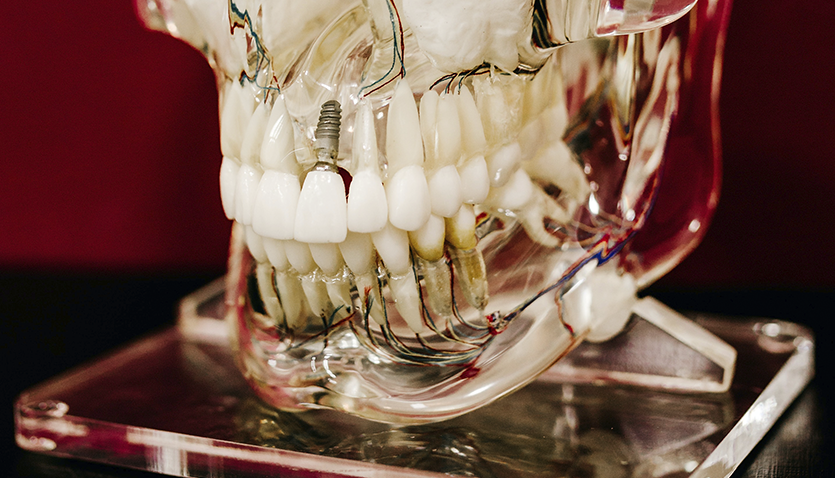
Zirconia crowns for dental implants are an advanced and aesthetically appealing option for replacing missing or lost teeth. Zirconia is a highly durable and translucent ceramic material that offers an excellent combination of strength and aesthetics, making it a sought-after choice for crafting dental crowns.
Zirconia is a type of zirconium oxide ceramic used to create highly durable and naturally aesthetic crowns. Its translucency allows light to pass through the material similar to dental enamel, providing a highly natural and discreet appearance in the smile. Additionally, zirconia has a light white color, making it an excellent choice for anterior teeth (front teeth) or visible teeth.
What are their benefits?
The main benefits of zirconia crowns for dental implants include:
- Natural Aesthetics: Zirconia is known to provide a highly aesthetic and natural appearance, offering a restoration that closely resembles natural teeth in color, shape, and translucency.
- Strength and Durability: Zirconia is highly fracture and wear-resistant, making the crowns extremely durable and capable of withstanding chewing forces similar to natural teeth.
- Biocompatibility: Zirconia is a biocompatible material, meaning it is well-tolerated by gum tissue and does not cause irritations or allergies.
- Hypoallergenic: Zirconia is hypoallergenic, making it an excellent choice for patients with sensitivities or allergies to other dental materials.
- Less Adjacent Tooth Wear: Zirconia is gentler on adjacent teeth compared to other materials, reducing wear and abrasion of neighboring teeth.
- Stain Resistance: Zirconia crowns have a smooth and non-porous surface, making it difficult for stains and discolorations to adhere, maintaining long-term shine and aesthetics.
Zirconia crowns are particularly recommended for replacing anterior (front) teeth or highly visible teeth where aesthetics are a primary concern. However, they can also be used for posterior teeth, especially in cases where a highly resistant and durable replacement is needed.
It’s important for the patient to have a previously placed dental implant with complete osseointegration before receiving a zirconia crown. The placement of zirconia crowns requires precision, and only a qualified dentist can perform the procedure to ensure optimal aesthetic and functional results. Additionally, as with any dental restoration, proper oral hygiene and at least two annual visits to the dentist are essential to maintain the health and longevity of zirconia crowns and implants.
If you’re ready to write your own transformation story, I invite you to discover the power of implantology and the complete smile that awaits you.
